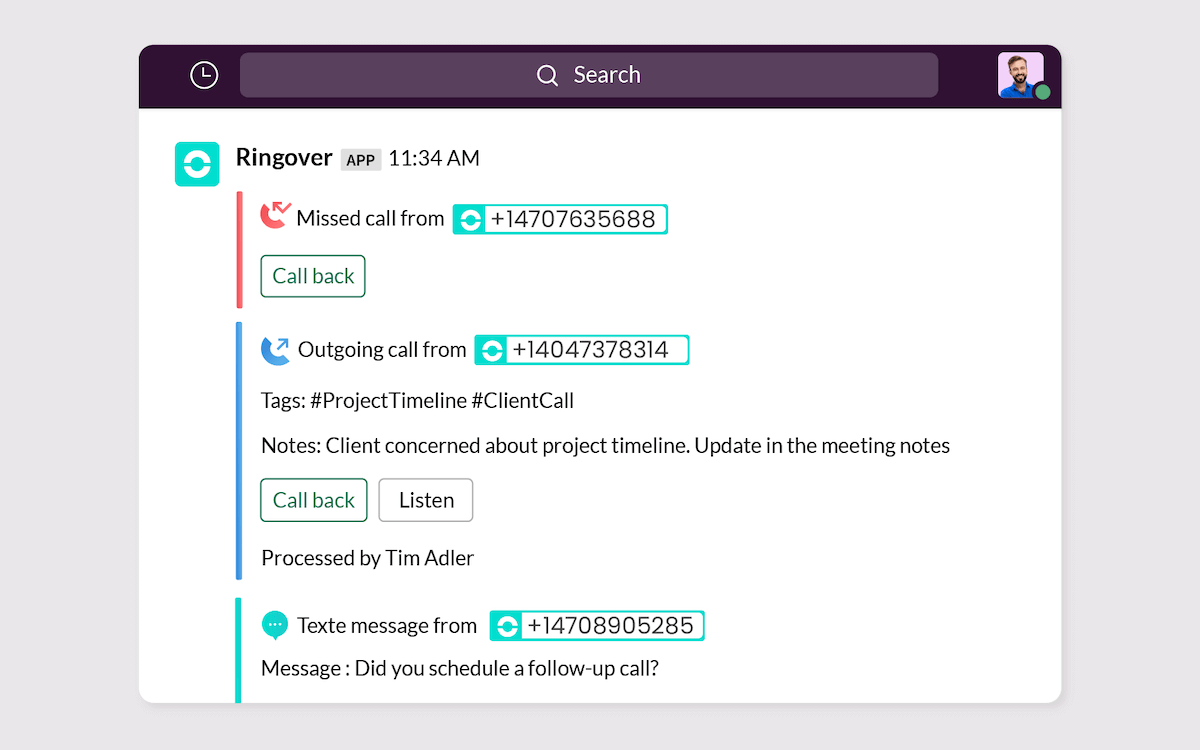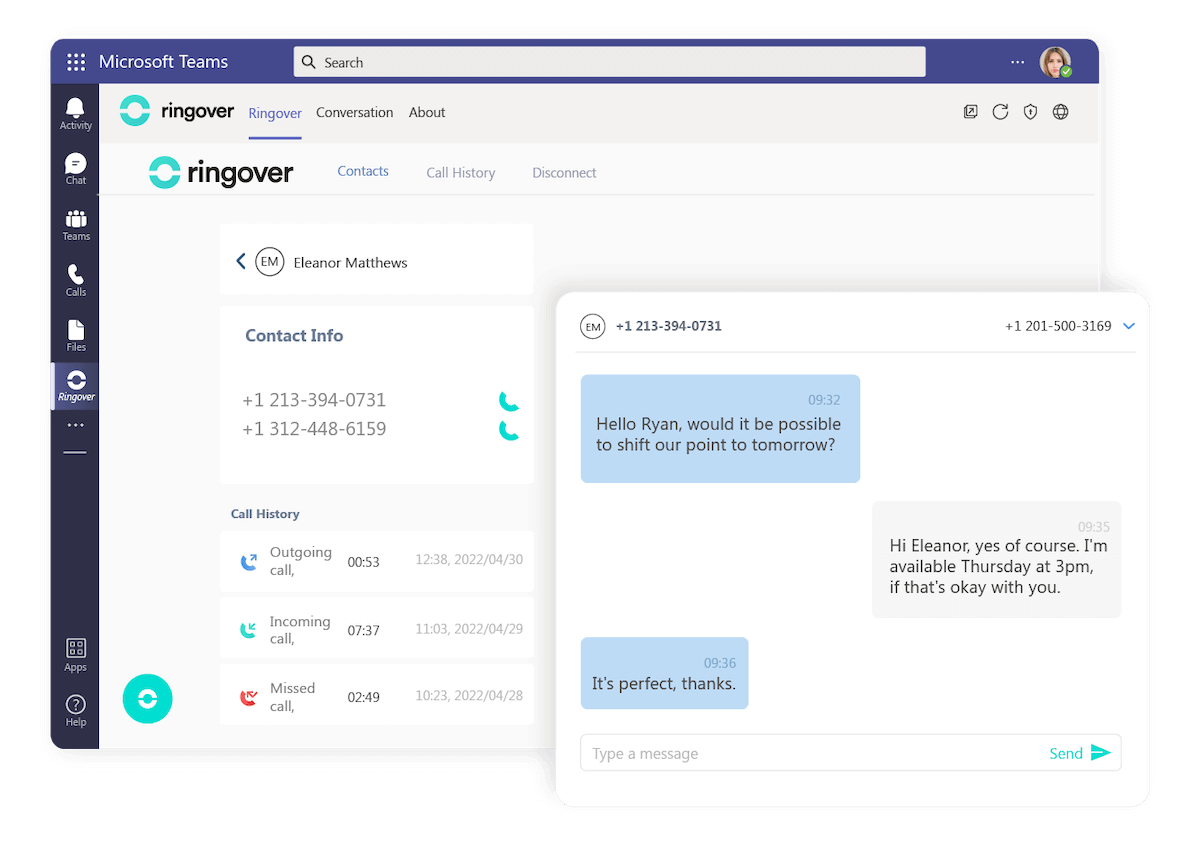Summary
With the right application, businesses can boost their interactions with their contacts, resolve their issues, and even use automatic response systems. Instant messaging apps are also used within businesses for collaboration amongst teams. So, which app is the right app for you? Let's take a look and find out.
Top 10 Instant Messaging applications
1. Ringover
Ringover's CCAAS solution also facilitates collaboration between teams. It isn't designed to replace apps like Slack, but it does allow you to save time on tasks linked to your telephony.
Here are a few of the must-have features offered by Ringover:
- Integration into business tools
- Discussion channels
- Private or group conversations
- Call transfers from the Chat Bar
2. Slack
Released in 2013, Slack doesn't really need an introduction these days, it's become a business go-to. It's a communication tool allowing efficient and secure collaboration within an organization.
In 2020, the app announced that it boasted no fewer than 18 million active users! It's highly possible that Slack has since exceeded the 20 million user mark. In 2020, the start-up behind Slack was taken over by leading CRM Salesforce, at the more-than-respectable price of $27 million. Here are a few of Slack's must-have features:
- Channels (spaces for discussions between members): The perfect feature for team conversations, and also for particular projects between members of different teams.
- Direct messages: A comprehensive instant messaging solution with the option of customizing your text, adding links, and sharing files.
- Integrated search function: This is a tool that lets you easily find a particular message or file in all your conversations.
- A high level of customization (for channels, notifications, display, etc.).
- Third-party app integration. You can integrate more than 1,000 apps into Slack to help you in your daily tasks. For example, with the HubSpot integration, you can answer questions asked via your website directly in Slack.
- The Slackbot automatizes manual tasks and saves time in your daily work.

3. Microsoft Teams
Teams is a collaborative work solution developed by Microsoft. Use of it really boomed during the Covid-19 pandemic, and Microsoft really got its foot in the door thanks to its Office 365 suite. According to Statista, 270 million use Teams each month. Teams stands out in particular with its co-publishing features, but that's not the only trick up its digital sleeve: With Teams, you can:
- Create channels, a bit like Slack but with fewer customization options;
- Integrate other softwares to automatize tasks or avoid constantly toggling between windows;
- Organize online meetings and host video calls;
- Share files;
- Access storage space.

4. Facebook Messenger & Workplace
As we mentioned earlier in this article, Facebook clearly took business' needs into account when developing its instant messaging service. Messenger Business allows companies to focus on communicating with their customers.
Currently, Facebook Messenger Business is used by a staggering 40 million people each month. Here are a few of the options offered by Messenger Business:
- Set up automatic messages
- Chatbots
- Create a customized customer experience
- Messenger ads and sponsored messages
- Transparent integration with the website
For internal collaboration, Facebook offers Workplace, a platform which has become an exclusively paid service since 2020. In 2021, Facebook revealed that it had reached 7 million paid subscriptions for its service. Here are a few of the tool's key features:
- The option to start video calls directly
- Instant messaging
- Integration into business tools

5. WhatsApp Business
Like Facebook Messenger, WhatsApp also has its own Business app. It's used by 50 million people each month. 15 million of these are based in India, and 5 million are in Brazil.
These figures aren't surprising given the popularity of the classic WhatsApp app in these regions. The other interesting statistic has been shared by Telemedia, revealing that messages sent via the WhatsApp Business API have a 99% opening rate. Discover some of WhatsApp Business' most useful features:
- The option of automatic message sending
- The use of chatbots
- 1,000 free conversations/month
- Product catalog
6. WeChat For Business
Extremely popular in China, WeChat also offers a version dedicated to businesses. This app is especially useful as a channel for sales and marketing. Here are a few examples of features that are of interest for businesses:
- Tools to enrich user experiences (surveys, mini games, promotions)
- Website integration into WeChat
- Option of creating an online store (WeChat Store)
- Payment service
7. Line for Business
Line offers a whole list of features designed especially for businesses. They're just as you'd imagine them to be: Customer-focused. Here are a few of them:
- Chatbots driven by artificial intelligence
- Audio/video calls
- Surveys
- Automatic replies
- Sponsored stickers
- Line Pay payment service
- Line Ads
A must-have for the general public, instant messaging apps are also finding their way into more formal settings. A rapidly growing number of businesses are deploying them for their external communications with customers. According to Statista, 41 million messages are sent every minute via these various apps. That's a lot of business opportunities just waiting to be taken.
It's also the case within businesses, where chats and their well-known channels are progressively taking over the good old email inbox. Rich in features and easy to use, these apps go well beyond simple text exchanges. You can use them to share multimedia items, documents, and stickers. It's also possible to make audio or video calls, and much more.
Each year, the most competitive instant messaging software publishers churn out more and more features to enhance their apps. So, which one should you go for as a business? What are the advantages of messengers? Before answering this question, we need to firstly define what an instant messaging tool is.
What is an instant messaging app?
Instant messaging apps are tools allowing for the exchange of messages on a synchronized and real-time basis. It's also one of the aspects that sets them apart from email services.
Whilst these apps were initially used for written messages, they're now able to exchange documents and other file types, too. Some of them even let you share you screen and have VoIP features, such as group calls and video calls.
What are the instant messaging apps most used by the general public?
In this next section, we'll do a flying tour of the top instant messaging apps for the general public, so we can get insights into markets and targets.

Facebook Messenger
Facebook Messenger is almost a given on everyone's phones these days. It has obviously taken advantage of the vast user pool on the social media network. Before its launch as a standalone app, it was an instant messaging feature in Facebook.
After a dozen years of existence as a feature, it became an app in its own right, although tightly tied to Mark Zuckerberg's social network. Today, 20 billion messages are exchanged each month via Messenger and the app now has an incredible 1.3 billion active users.
Facebook Messenger also has a version specifically for businesses. Here is the list of its key features:
- Voice notes
- Private and group conversations
- "Secret”conversations
- Multimedia file sharing
- Disappearing messages
- Location-sharing
With its 2 billion active users, WhatsApp is hands-down the most popular app in our selection. Initially launched on mobile devices, it's become a multi-platform app over the years.
You can now use WhatsApp on your computer. Over recent years, WhatsApp has taken a few blows to its user numbers, particularly following the concerns over its use of user data, and the fact that it was taken over by Facebook in 2013.
WhatsApp also exists in a Business version, which we'll cover later on in this article. Here are a few of the app's key features:
- Multi-platform use
- Private or group conversations
- Voice notes (option of speeding up voice note playback)
- Sharing documents and multimedia files
- Audio and video calls, private or group
Telegram
Launched in 2013, the Telegram app has grown in popularity over recent years, particularly thanks to its multi-feature channels for users which secure conversations and files. Today, Telegram has 550 million users. Here are its key features:
- Up to 200,000 members per group
- Forums (channels)
- Secret conversations
- Self-destructing messages
- Multi-platform use
- Audio and video calls
- File sharing (up to 2 GB)
- Multiple accounts
Signal
Signal really prioritizes security. It may not be the most popular app on the market, but it's certainly the one that offers the most reassuring experience for a user with security concerns.
Signal was also one of the first apps for the general public to offer end-to-end encryption by default for instant messaging, as well as for VoIP phone calls. Discover Signal's features:
- Audio and video calls, private or group
- End-to-end encryption of communications by default
- Voice notes
- No collecting user data
- Sharing documents and multimedia files
Viber
As you can see with Telegram and Signal, despite the Big FB dominating the sector, there are still publishers managing to breath through. This is particularly the vase for Viber. Launched in 2010, it now has more than 400 million monthly active users. Viber is popular for:
- Its stickers
- Audio and video calls
- Voice notes
- Private and group conversations
WeChat is the equivalent of Facebook Messenger on the Chinese market. Launched in 2011, it ranks 3rd place in the most-used instant messaging apps in the world, just behind WhatsApp and Messenger.
An extremely popular app in Asia, WeChat stands out from the competition with its many, many features. The app literally lets you do everything:
- Order food
- Have private or group conversations
- Pay for your taxi
- Make a doctor's appointment
- Buy tickets for travel or events
- Pay for shopping
- Make phone calls
Line
Like WeChat, Line is a very popular app on the Asian market. It has no fewer than200 million monthly active users. Here are the features behind its success:
- Sending animated emojis
- Games
- Voice notes
- Sharing documents and multimedia files
- Stickers
Skype
Launched in 2003, Skype is one of the longest-standing apps in our selection Now used by more than 300 million users, the app became popular as one of the first online telephony options for the general public. Here are Skype's key features:
- Private and group conversations
- Video calls
- Screen-sharing during calls
- Switching calls to VoIP from landline or mobiles.
- Sharing files
Discord
Relatively new on the scene (2015), Discord first won over the gamer community. Today, it has more than 150 million active users. It's not surprising that Discord proved to be such a hit.
Microsoft had its eye on the app and tried to buy it (unsuccessfully) for the staggering price of $12 billion. Here are a few of the must-have features offered by Discord:
- Direct messages
- Group conversations
- Multimedia file sharing
- Voice calls
- Video calls
- Pinning important messages
- Server system that can be split into channels
- Internal search engine
The advantages of instant messaging applications for businesses
After having reviewed the various instant messaging solutions available, let's take a closer look at their key advantages for businesses:
Improving and multiplying interactions
These applications are incredibly effective acquisition leverage points! Instant messaging services are used by millions of people each day, and it would be a shame not to hop onto this opportunity train. Tools like these can allow your business to branch out into different markets.
Improving engagement
Having to contact a business can be a real hassle for a lot of people. Using a popular messaging app for your customer services means that you can offer your users an experience that fits in with their daily habits, making things much easier for them.
Integrating other tools and automatizing workflows
All of the business solutions covered in this article can be integrated into your business tools, such as a CRM or a business telephony solution. What's the aim? Simply to keep all your communication channels on a single omni-channel platform, to save time on low added-value tasks (identity authentication, communication history, qualification, etc.).
Reducing costs and call queues
Instant messaging apps can help to free up your phone lines. Chatbot configurations and automatic replies in instant messaging apps help to reduce wait times on the phone.
The more efficient this configuration, the less need the customer will have to contact your call center. There are multiple benefits; Via these channels, customers can get an answer to their questions without having to wait on the phone, which frees up your agents' time so that they can focus on other tasks.
By combining this with the implementation of a call priority queue in your business telephony software, you'll be offering customers a better experience while also reducing your costs.
Final word
Instant messaging apps are integral parts of day-to-day life for both the general public and businesses these days. Businesses need to branch out into new markets to keep up with the competition.
App publishers are aware of this and now offer professionals platforms for keeping in touch with their prospects/customers and developing new acquisition options.
Other more or less specific apps, such as Ringover, focus more on team collaboration and productivity. To find out more about the other features offered by Ringover, get in touch with our experts by giving us a call at +33 (0)1 84 800 800 or simply sign up for free to trial our communication solution.
Published on November 29, 2023.

